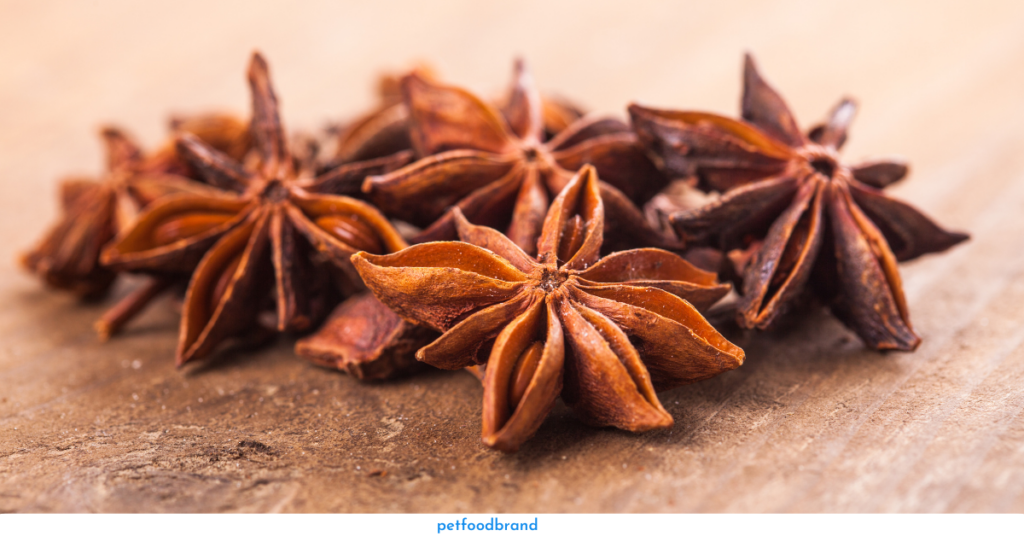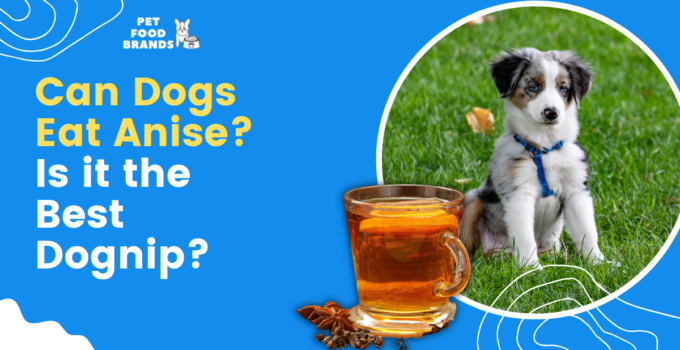Is there a catnip for dogs? All cat owners are familiar with catnip and its magical effects. It is often rumored that Anise for dogs produces similar results. But is this true? Can dogs eat Anise?
For centuries, people have used Anise as herbal medicine to solve issues like flatulence and bad breath. The herb also serves as a treatment for insomnia, a food additive, and a soothing tea. Unlike fennel or licorice, Anise has a sweet flavor and a strong aroma.
Can Dogs Eat Anise?
The answer is yes; dogs can have Anise or aniseed. However, as with other things, dogs should only be given Anise in moderation. If you want to give your dog aniseed or powder, you should always consult your vet about dosage.
Can Dogs Eat Anise Seed?
Anise seed sprinkled on dog food is completely safe to eat. It can also be ground and added to biscuits or given to dogs as a flavoring agent. Also, you can prepare anise tea to give to your pet.
Anise seed for dogs can be used to make different dog treats.
Can Dogs Eat Anise Oil?

No, dogs should never be given anise oil to ingest. Moreover, don’t apply the anise oil directly to the dog’s body.
In the case of anise essential oil, dilution is standard practice. A small amount of sweet almond oil is added to create a mixture.
You can use anise oil on your dog’s sensitive nose and allow it to inhale the scent. Intoxicating scents can quickly calm your dog down.
Anise Benefits for Dogs
- For digestive problems, such as nausea, irritable bowels, and flatulence.
- Anise is helpful in severe cases like seizures, respiratory issues, coughs, nasal discharges, and chest problems.
- Its antiviral and antibacterial properties make it a natural remedy for infections.
- Anise also helps prevent cancer and cardiovascular diseases.
Is Anise Safe for Dogs?

Anise may be safe and healthy for dogs if used in moderation. Overfeeding Anise to your dog can be potentially dangerous can even be fatal.
Too much Anise can cause depression, diarrhea, stomach upset, lower heart rate, unconsciousness, vomiting, and coma.
Contact your veterinarian right away if your dog has difficulty breathing, or his heart rate has dropped due to eating too much Anise.
Is Anise bad for dogs? No, it’s definitely not. However, if not taken in moderation, anise can prove to be bad for dogs.
Did you know that Anise is also used in Cat food toppings?
Cautions
Give fresh Anise or anise seed in small quantities. Monitor the dog for some time. If you observe any abnormalities, contact your vet.
Many people believe that Anise produces the same effects as catnip on cats. It might even get your pet high. Even though he may appear hyper or mellow, his behavior may differ markedly.
If you are giving your dog anise, only give small amounts. Be sure to follow the dosage instructions. Consult your vet about which form of Anise your dog needs.
Is anise same as catnip? No, you should be aware that Anise is not the same as catnip, but it’s a close substitute. When you coat a dog’s toy in anise oil, your dog will get extremely excited by the scent.
Anise can have a positive effect on your dog’s behavior. Some dogs may reduce activity levels, while in others, it may increase vigor and liveliness.
3 to 5 aniseeds per pound of dog food is enough to calm and soothe your pup. Dognip tea or water can be also be used.
Are Anise and Fennel the Same?
Despite their similar appearance and similar flavors, Anise and fennel are different. Anise plants only have edible seeds, while the majority of fennel plants are edible. Fennel is more of a vegetable than an herb, whereas Anise is a spice.
What is the Duration of Catnip’s Effect on Dogs?
It takes about 30 minutes for catnip to work on dogs. Catnip’s soothing effects last for at least five to 20 minutes after it is consumed. It would be best to administer it at least half an hour in advance of stressful events such as a trip to the veterinarian.
Conclusion
Finally, can dogs have anise?
Is it the dog version of catnip? Is it equivalent to catnip? Can dogs eat anise safely?
Due to its intoxicating properties, Anise is frequently referred to as dog nip.
Herbs like this can calm dogs and arouse the dog’s senses, and make them excited as well.
Furthermore, Anise offers a variety of benefits for your dog’s health.
A dog who can find your stash of Anise is likely to eat it all.
Be careful not to overfeed your dog anise, and make sure all of your supplies are safe and out of reach.

Ankita is a passionate pet lover and head of content at Pet Food Brands. With her extensive knowledge and research, she provides pet owners with top-quality information on dog food and nutrition. Her dedication to improving the lives of dogs makes her a leading voice in the industry.




